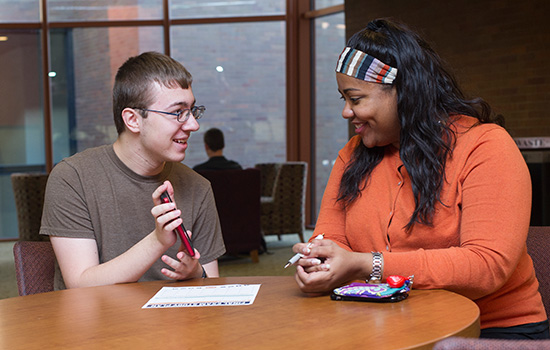Preparing students on autism spectrum for success
A. Sue Weisler
Success Coach Atiya Smith, right, talks with Nathan Terrell about finals week during one of their weekly coaching sessions. Terrell is a first-year game design student from Centennial, Colo. Individualized coaching sessions make RIT's Spectrum Support Program unique.
Kieran Barrett-Snyder has a passion for science and numbers. Nathan Terrell loves to ask questions and hold in-depth conversations. Jessica Wheeler sings and plays piano for a religious life group on campus.
All three are full-time undergraduate students at RIT, and all three are a part of the 3.5 million Americans who, according to Autism-Society.Org, live with an Autism Spectrum Disorder.
RIT is one of the leading universities in the nation in preparing students on the autism spectrum for professional success. Its strength stems from a combination of the Spectrum Support Program, which helps students on the autism spectrum navigate college, and the cooperative education program, which requires a majority of students to gain work experience prior to graduation. No exceptions.
The Spectrum Support Program has grown exponentially since it started close to nine years ago. It provides students with an opportunity to enroll in a structured program with innovative support tailored specifically to the individual student through an individual coach. The program is one of about only 50 in the country.
“We don’t specifically recruit students on the spectrum, but we do have a program that people know about and come to us for,” said Laurie Ackles, program director. “What we really do is support RIT students who just happen to be on the autism spectrum. They’re RIT students first, and we are just another resource and we understand and work to support their unique needs.”
Jane Thierfeld Brown, an assistant clinical professor at Yale Child Study, Yale Medical School, said that RIT is a model program when it comes to preparing students on the spectrum for opportunity beyond college.
Brown works as a consultant to families and universities and was a consultant on the grant that was received by RIT from the National Science Foundation to start the program in 2008.
“The advantage for somebody on the spectrum to graduate with work experience is huge,” said Brown. “Many times these students can succeed academically, but entering the work world can be a major barrier. RIT is unique because of the co-op model, and Laurie has been a really crucial player in getting universities around the nation to think more about preparing students for careers, not just academic success.”
Recognizing a need
When Ackles was hired to direct the Spectrum Support Program in 2008, there were very few schools in the country that were offering autism-specific services.
Before then, RIT was providing accommodations to students through the Disability Services Office but found that spectrum students were seeking a different kind of support.
“It’s highly individualized, resource intensive and time intensive work to support these students in the best way possible,” Ackles said. “The need was greater than what Disability Services had resources for, and once this was identified, RIT took the initiative and did more to support those on the spectrum by creating a program that could reinforce their needs.”
The pilot program was comprised of 12 students, small compared to the nearly 70 that the program supports today.
Barrett-Snyder is one of the students enrolled in the program this academic year. The 19-year-old Long Island native transferred from New York University to RIT last fall to major in electrical engineering.
“I originally went to NYU because of how much closer it was to my home, but after realizing that there were limited accommodations for me to take advantage of, I knew that I had to leave,” Barrett-Snyder said. “RIT was a school that I had been interested in from the beginning, but I made the decision to transfer because of the specialized support program offered for students on the spectrum. It’s been really helpful for me ever since.”
At NYU, he was living in a suite with three others and found himself feeling socially uncomfortable.
“If my roommates were out in the common area, I felt trapped,” he said. “I didn’t feel like they understood me, so I ended up staying in my room a lot, which was very problematic for me. It was very difficult for me and causing a lot of stress.”
At RIT, Barrett-Snyder was placed in a single dorm room, but with the help of the Spectrum Support Program, he will be opting for a different housing option next year.
“I’m going to try living in a Global Village apartment with a few other people in the program,” he said. “We’ll see how that goes.”
Beyond housing accommodations, Barrett-Snyder said that the most helpful part of the program for him has been the individual coaching sessions.
“I meet with my coach twice a week. I know that a lot can change for me in a week, so to meet twice is very important,” said Barrett-Snyder. “I talk to her about how things have been and what’s been going on, and we make a plan of what I’m going to do with my time to help me be successful and stay on track until the next time that we meet.”
Barrett-Snyder said that the frequency of the meetings changes based on what works best for the individual student.
“It’s not only academic coaching,” Barrett-Snyder said. “We’ll talk about what I’m doing to meet people outside of classes, and making plans with friends.”
Importance of coaching
Atiya Smith is one of a handful of coaches employed by the Spectrum Support Program to act as a mentor to students. Smith, who is a licensed therapist and current Ph.D. student in counseling at the University of Rochester, is in her second year of working with the program.
“I became acquainted with the program when I was doing my internship at the Counseling Center two years ago,” Smith said. “I met Laurie through my work, and now I am a mentor to about nine students on the spectrum.”
Since its beginning, the Spectrum Support Program has employed several graduate student coaches from RIT’s school psychology program to act as coaches to its students. The program also hires local professionals and doctoral candidates, like Smith.
Terrell, who came from Centennial, Colo., to RIT for the combination of the Spectrum Support Program and the highly ranked game design program, is one of the students that Smith works with each week. Terrell said having Smith as a mentor has been an important part in helping his transition into his first year of college.
“My mom helped me a lot when it came to picking a college,” said the first-year student. “Having a support program wasn’t super important to me at the beginning, but since I’ve gotten here, I’ve realized how great it has been to have.”
Academically, Terrell hasn’t had any issues adjusting to college, but he said that socially, things have been up and down.
“My classes have been really easy so far, but I’ve had to work on building friendships,” said Terrell. “I didn’t really have any friends before I came here, and when you’re in a new place you’re not going to have any at first, regardless, so that’s been something that we’ve been working on.”
Like many of the students enrolled in the program, Terrell had previous experience with disability services offered through his high school, but he said that the differences between those and the coaching that he gets through the Spectrum Support Program have been drastic.
“Before I came to RIT, I would work with school counselors, but they were always pretty busy with other things. I get Atiya’s full, undivided attention, and she understands my point of view,” he said. “I have a lot of questions that I don’t know the answers to, and I’ve never really had anybody to ask them to. Now I do.”
Wheeler, another one of the students coached by Smith, was originally planning to attend Monroe Community College but made a last-minute decision to attend RIT in the fall of 2015.
“I’m local to Rochester, so I was aware of the services offered by RIT, but I wasn’t sure that I could handle going to a bigger school,” said the second-year engineering exploration student from Pittsford, N.Y. “In the end, I made the decision to come here, and I’m glad that I did.”
During her first semester of college, Wheeler was not enrolled in the program and she said that she really struggled with the transition. Wheeler said that she relied on her mom for a lot of support in high school, something that she didn’t have during her first year at college.
“I didn’t realize how much she had been there for me until I had to do things on my own. She would make sure I got out of bed in the mornings, and help me to know what homework I had to do. It sounds simple, but it’s not when you’re on the spectrum. Attendance was a huge issue for me my first semester.”
Following her enrollment in the Spectrum Support Program, Wheeler said that things improved for her both socially and academically. She’s become involved with CRU, a religious life group on campus, and has made a lot of friends through that. The challenges that she faces academically, though, are still very real.
“I’ve had to drop a few classes just because of the time that it takes me to do everything. And I mean everything,” said Wheeler. “People think that you just need more time to work on tests, but I need extra time planning. I need extra time studying. I need extra time to get ready in the morning. There just aren’t enough hours in the day, but Atiya has really helped me to become more organized and make plans to help achieve my goals.”
Getting a job
Ben Satkiewicz ’14 (electrical engineering) was one of the original 12 students who made up the pilot program when he was a freshman in 2008. Satkiewicz, from Evanston, Ill., was born in 1985 and said that he grew up in the ’90s when not as much was known about the autism spectrum.
“My parents were very diligent about getting me the help that I needed,” said Satkiewicz, who graduated from high school in 2004 and took classes at local community colleges before attending RIT.
Satkiewicz said that in order for a student on the spectrum to succeed, a certain level of grit and personal motivation is required.
“While certain supports make things easier for students on the spectrum, who are at a disadvantage in many ways, it’s ultimately up to the individual to find it within themselves to succeed,” he said. “You have to have the willpower to push through certain forms of societal rejection. That’s what I did.”
Since 2008, much has been done to better understand and support those on the autism spectrum, both within universities and the workforce.
Janine Rowe, an assistant director for Disability Services at RIT’s Office of Career Services and Cooperative Education, said that she is seeing more employers reaching out in an attempt to understand this population of potential employees.
“Right now there is a hunger among recruiters and managers to be made aware of how to best incorporate this population into the workforce,” Rowe said. “There is a shift in attitude when employers have a better idea of who they are working with and what they need to do to support an employee on the spectrum, but also what there is to be gained by doing so.”
Rowe said that helping employers understand how to work with an employee who requires more structure often leads to communication improvements and practices that benefit the company as a whole.
Beyond the individual coaching offered through the Spectrum Support Program, the Office of Career Services and Cooperative Education provides students on the spectrum with the opportunity to participate in various seminars that place emphasis on how to navigate the hiring process. The seminars cover topics varying from résumé building to behavioral preparation and employer meet-and-greets.
Students who have already held co-ops also are invited back to share their experiences.
“This is a student-led process with our support,” said Rowe. “These students are competing with their socially savvy peers for the same co-ops and that’s tough because they don’t interview the same way. We don’t go out and get them a job, but we provide them with the resources so that they are best equipped to do it themselves. Career skills are life skills, and this experience is critical.”
Satkiewicz is currently working in Chicago as an electrical engineer for Vapor Bus International, a leader in providing passenger door systems to the North American Transit Bus Industry.
“The interview process took me about six or seven months after I graduated,” Satkiewicz said. “I did interview for other jobs and got a few offers, but it was about finding a place that would work for me logistically.”
When embarking in the hiring process, students on the spectrum must make the decision about whether to disclose their disability to their potential employer. Some fear discrimination because of a negative stigma attached to Autism Spectrum Disorders.
Satkiewicz disclosed.
“For me, it was helpful to get it all out there on the table ahead of time, in order to find a company that would best fit my needs,” he said. “The interview process goes both ways and it’s helpful to be straightforward so that you can weed out the employers who you wouldn’t want to be working for down the road. There are certain handicaps that I have, but I’m really successful in my work because I found a place that I fit.”
Barrett-Snyder is also planning to disclose. He is currently preparing to find an electrical engineering co-op for the summer. He said that he’s a bit nervous about the process, but that the services offered through RIT have helped him a lot.
“In my personal life, I normally don’t bring up that I have autism, and when people find out, they are typically surprised,” he said. “It’s a spectrum and I’m high-functioning, meaning that it only impacts certain aspects of my life, but sometimes it feels like there’s shame in admitting that you have it. There shouldn’t be. A lot of times when I get comfortable in a situation, I can be just like anybody else.”
About Autism Spectrum Disorder
Autism Spectrum Disorder is the name for a group of developmental disorders. ASD includes a wide range, “a spectrum,” of symptoms, skills and levels of ability. Characteristics include:
- Difficulty navigating social situations
- Repetitive behaviors and difficulty adapting to change
- Heightened sensitivity to various sensory information
- Having a lasting, intense interest in certain topics, such as numbers, details or facts
According to the Centers for Disease Control and Prevention, 1 in 68 children has been identified to have some form of ASD.
To learn more
The RIT Spectrum Support Program caters to all students with Autism Spectrum Disorders who are pursuing undergraduate degrees. For more information, go to rit.edu/ssp or contact Laurie Ackles at laaldc@rit.edu.
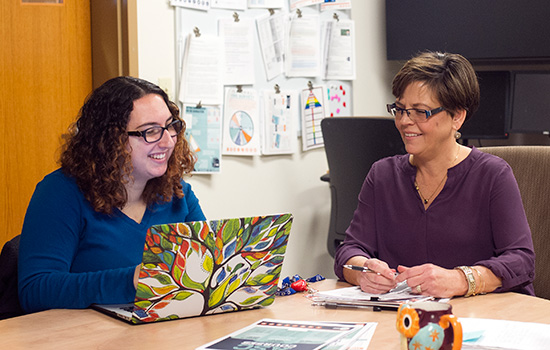 Spectrum Support Program Director Laurie Ackles, right, meets with Nahoma Presburg, one of the success coaches employed by the program to work with enrolled students. A. Sue Weisler
Spectrum Support Program Director Laurie Ackles, right, meets with Nahoma Presburg, one of the success coaches employed by the program to work with enrolled students. A. Sue Weisler
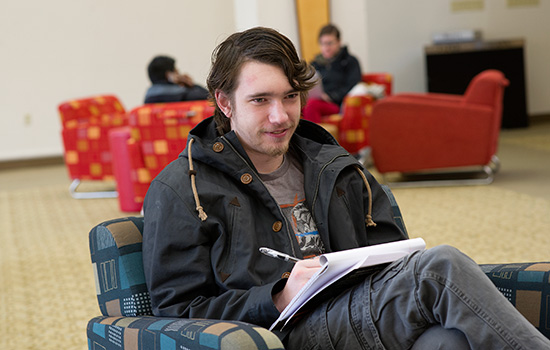 Kieran Barrett-Snyder transferred from NYU to RIT to take advantage of the services that RIT offers to students on the autism spectrum. A. Sue Weisler
Kieran Barrett-Snyder transferred from NYU to RIT to take advantage of the services that RIT offers to students on the autism spectrum. A. Sue Weisler
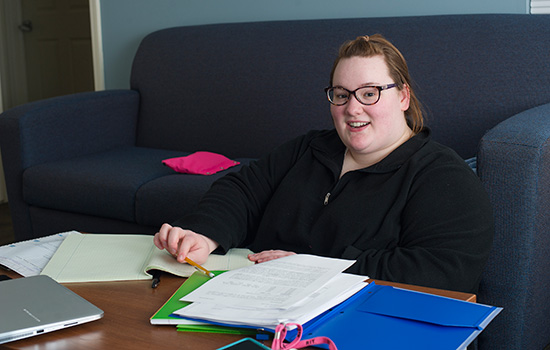 Jessica Wheeler, a second-year engineering exploration major, said things improved for her both socially and academically after she enrolled in the Spectrum Support Program last spring. A. Sue Weisler
Jessica Wheeler, a second-year engineering exploration major, said things improved for her both socially and academically after she enrolled in the Spectrum Support Program last spring. A. Sue Weisler
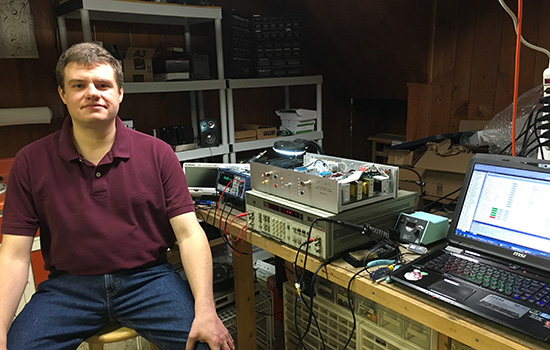 Ben Satkiewicz '14 (electrical engineering) works for Vapor Bus International in Chicago. He is seated here with sound equipment that he works with as a hobby. He says for a student on the spectrum to succeed, a certain amount of grit is needed.
Ben Satkiewicz '14 (electrical engineering) works for Vapor Bus International in Chicago. He is seated here with sound equipment that he works with as a hobby. He says for a student on the spectrum to succeed, a certain amount of grit is needed.
